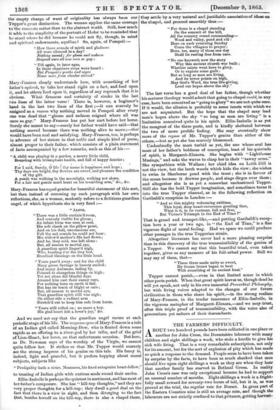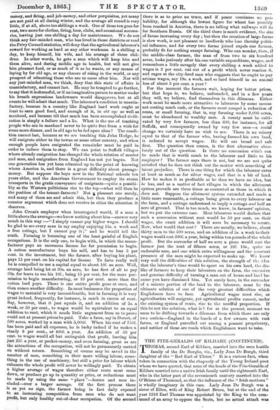THE FARMERS' DIFFICULTY.
ABOUT two hundred pounds have been collected in one place or another for John Cross, the Dorsetshire labourer with many children and eight shillings a week, who stole a hurdle to give his sick wife firing. That is a very remarkable subscription, not only for its amount, but for the sort of explosion of pity which has made so quick a response to the demand. People seem to have been taken by surprise by the facts,_ to have been as much shocked that men should live upon eight shillings a week as they are when they hear that another family has starved in Bethnal Green. In reality John Cross's case was only exceptional because he had to support an unusual number of mouths. Eight shillings a week is a fright- fully small reward for seventy-two hours of toil, but it is, as was proved at the trial, the regular rate for Dorset. In great part of the Eastern Counties nine is still an average rate, and though the labourers are not strictly confined to that pittance, getting harvest-
money, and firing, and job-money, and other perquisites, yet many are not paid at all during winter, and the average all round is very little, if at all, above ten shillings a week. One of these ten goes for rent, two more for clothes, firing, beer, clubsi, and occasional necessa- ries, leaving just one shilling a day for maintenance. We do not think any fair-minded man, who has lived in those districts or read the Privy Council statistics, will deny that the agricultural labourer's reward for working as hard as any other workman is a shilling a day, to keep himself, his wife, and his average of three chil- dren. In other words, he gets a sum which will keep him and them alive, and during middle age in health, but will not give him pleasant food, or as much of it as he wants, or any means of laying by for old age, or any chance of rising in the world, or any prospect of educating those who are to come after him. Nor will any just-minded man, we think, deny that this state of affairs is unsatisfactory, and cannot last. He may be tempted to go further, to say that it is shamef al, or if an imaginative person to mutter under his breath expressions landowners would disapprove, but at all events he will admit that much. The labourer's condition is unsatis- factory, because in a country like England hard work ought at least to earn good food, and enough of it, in old age as well as manhood, and because till that much has been accomplished civili- zation is simply a failure and a lie. What is the use of teaching people who are in manhood never to be quite free from a wish for some more dinner, and in old age to be fed upon alms ? The condi- tion cannot last, because as we are teaching this John Hodge, he will emigrate either to the towns or some other country, and when enough people have emigrated the remainder must be paid in order to induce them to stop. We can point to Suffolk villages where already emigration has changed the whole relation of master and man, and emigration from England has not yet begun. Not one generation has yet been educated up to the point of knowing where America is, and there is a great difficulty about passage- money. But suppose the boys now in the National schools ten years older, and the American Government to employ its steam transports in the gratis conveyance of emigrants—quite a possibi- lity as the Western politicians rise to the top—what will then be the position of the tenant-farmers ? Not I" pleasant one surely, and many of them see and admit this, but then they produce a counter argument which does not receive in cities the attention it deserves.
John Cross's employer when interrogated would, if a man a little above the average—we know nothing about him—answer very ranch in this way :—" I simply cannot pay higher wages. I should be glad to see every man in my employ enjoying 15s. a week and a free cottage, but I cannot pay it ;" and he would tell the truth. Farming is becomiog one of the least gainful of English occupations. It is the only one, to begin with, in which the manu- facturer pays an enormous license fee for permission to begin. A cotton manufacturer buys his mill, and has to lose 5 per cent. in the investment, but the farmer, after buying his plant, pays 15 per cent. on his capital for license. To farm really well he is compelled to use a capital equal to about 10/. an acre. Well, average land being let at 30s. an acre, he has first of all to pay 30s. for leave to use his 10/., being 15 per cent, for the mere per- mission to begin manufacturing, or 10 per cent. more than the cotton lord pays. There is one entire profit gone at once, and then comes another difficulty. In most businesses the proportion of wages to material is very inconsiderable, but in farming it is very great indeed, frequently, for instance, is much in excess of rent. Say, however, that it just equals it, and an addition of 5s. a week, or 50 per cent., to wages would be equivalent to an equal addition to rent, which it needs little argument from us to prove could not at present prices be paid. Take a farm, say in Dorset, of 500 acres, worked by a man with 5,000/. When his rent of 750/. has been paid and all expenses, he is lucky indeed if he makes a steady 8 per cent., or 400/. a year. An addition of 50 per cent. to wages would all but extinguish that profit, leaving him just 25/. a year, or pocket-money, and even farming, great as are the attractions of the occupation, will not be permanently carried on without return. Something of course may be saved in the number of men, something in their more willing labour, some- thing in the use of machinery, but still a price for labour which exhausts the whole profit will never be willingly paid. To obtain a higher average of wages therefore either rents mug, come down, or produce go up in quantity or price, or reductions mast be made by using the same "plant "—horses and men in- eluded—over a larger acreage. Of the first process there is as yet no sign, the farmer being in fact daily exposed to an increasing competition from men who do not want profit, but only healthy out-of-door occupation. Of the second
there is as to price no trace, and if peace continues no pro- bability, for although the lowest figure for wheat has possibly been reached in America, there is no telling what railways will do for Southern Russia. Of the third there is much evidence, the size of farms increasing every day ; but then the creation of large farms is slow work, is not pleasant to landlords who lose thereby politi- cal influence, and for every two farms joined expels one farmer, probably fit for nothing except farming. Who can wonder, then, if the middle-class farmer, the man of from two to six hundred acres, looks jealously after his one variable expenditure, wages, and remembers a little savagely that every shilling a week added to wages is 2 per cent. cut out of a profit which never reaches 8, and rages at the city-bred man who suggests that he ought to pay artisan wages, say 18a. a week, and so land himself in an annual loss of about 5 per cent, a year?
For the moment the farmers wait, hoping for better prices, but that hope is, we believe, unfounded, and in a few years they will, we believe, find themselves in this dilemma. Either work must be made more attractive to labourers by some means not costing much cash, or the farmers must compel a reduction of rents, or small farming, that is, any farming under 2,000 acres, must be abandoned to wealthy men. A county must be culti- vated by very few farmers, less than 600, for instance, for all Suffolk, and consequently owned by very few men—a social change we certainly have no wish to see. There is no misery equal to that of the farmer who, having farmed his own land, is reduced to accept wages. He will eat bread and salt first. The question then comes, is the first alternative abso- lutely out of the question. Is there no concession which can be made that is worth much to the labourer and little to his employer ? The farmer says there is not, but we are not quite satisfied that he does not think out the matter with something of latent prejudice. There is one thing for which the labourer cares at least as much as for silver wages, and that is a bit of land. How he makes it as profitable ail- he does we have no idea, but he has, and as a matter of fact villages in which the allotment system prevails are three times as contented as those in which it does not. Suppose the allotment system extended and made a little more reasonable, a cottage being given to every labourer on the farm, and a cottage understood to imply a cottage and half an acre of ground. That is too much, we know, in farmers' opinion, but we put the extreme case. Most labourers would declare that such a concession without rent would be 50 per cent. on their wages, the exact addition it will soon be necessary to secure. Now, what would that cost? There are usually, we believe, about thirty men to the 500 acres, and an addition of 5s. a week to their wages would cost 390/. a year, being within ten pounds of the whole profit. But the surrender of half an acre a piece would cost the farmer just the rent of fifteen acres, or 22/. 10s., quite an endurable sum, and one which extra williugness and the constant presence of the men might be expected to make up. We know very well the difficulties of this solution, the strength of the idea that the labourer's time would be spent on his own land, the dis- like of farmers to keep their labourers on the farm, the excessive and genuine difficulty of turning a man out of house and land be- cause you have dismissed him. Yet surely here, in the surrender of a minute portion of the land to the labourer, must lie the ultimate solution of one of the very greatest difficulties which Englishmen have to face. Agricultural wages must rise, or agriculturists will emigrate, yet agricultural profits cannot, under the existing system of rents, rise to the needful proportion. If this be not the solution, what is ? for at the present, moment we seem to be drifting towards a dilemma from which there are only two outlets—England in the hands of a few owners with vast farms, or England parcelled out among a peasant proprietary, and neither of these are roads which Englishmen want to take.



































 Previous page
Previous page